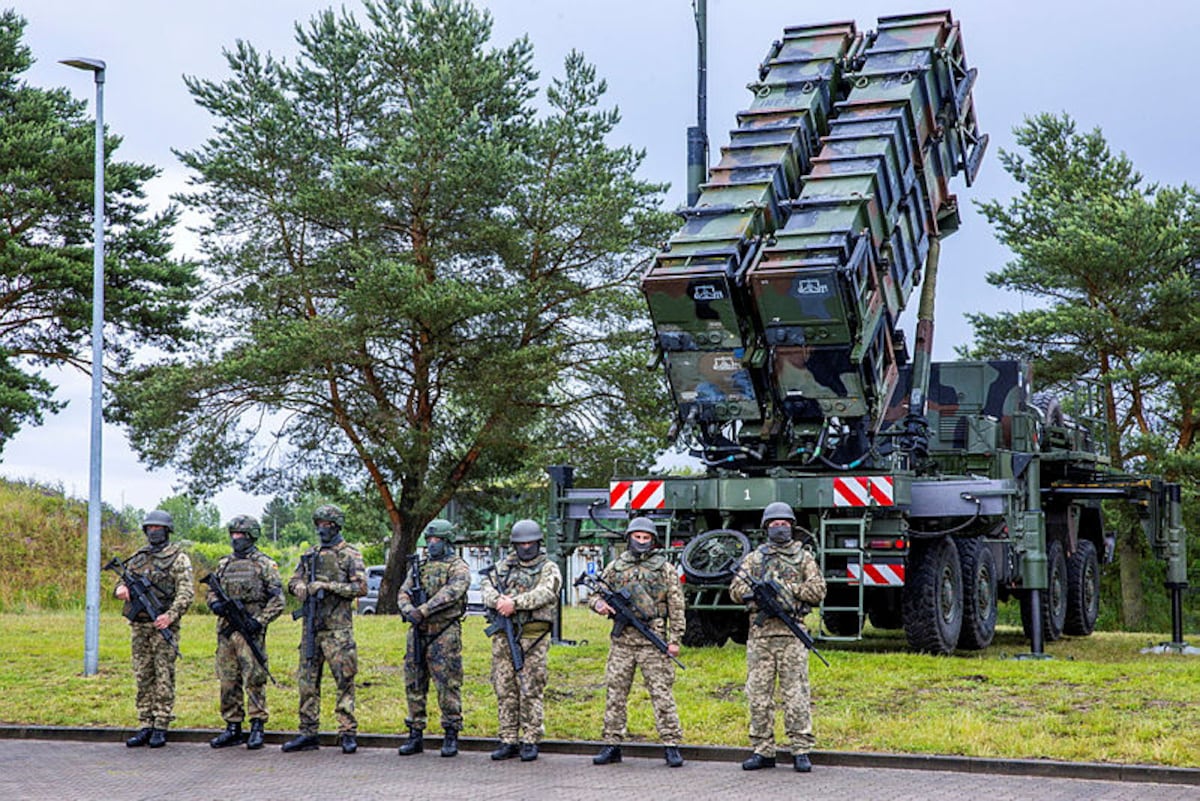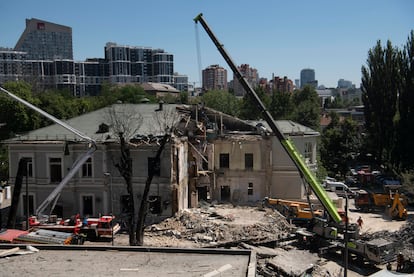Patriots and F-16s, the most coveted weapons for Ukraine to face the new wave of Russian attacks | International

While allies have been teasing how far Ukrainian artillery can fire inside Russian territory, Volodymyr Zelensky’s government has insisted in recent weeks that its allies give them at least something they can shoot down missiles launched for Moscow: air defense systems. The equation is simple. Russia fires long-range projectiles like the KH101, which hit the Ozmatdyt pediatric hospital in Kiev on Monday, from points far beyond Ukrainian fire capabilities. And it does so with an intensity and tactical flexibility that saturates Ukraine’s defensive shield.
The allies have reacted and signed their commitment at the NATO meeting in Washington this Tuesday so that Kiev has five new batteries as soon as possible to defend the country. In addition, United States President Joe Biden announced this Wednesday that the first F-16 fighter jets from Denmark and the Netherlands are on the way and will be operational this summer. These devices, still insufficient to have an impact on the front, could have defensive uses, either to intercept enemy missiles or as a deterrent against possible attacks by Russian fighter jets.
Even the best defensive shields made up of localization and tracking radars, as well as stationary or mobile batteries of surface-to-air interceptor missiles, have cracks. Eight of the 38 projectiles launched by the Russian military on Monday morning managed to strike Ukrainian soil, several of them in the capital, Kyiv, which is considered the best-defended city in the country. More than 30 people lost their lives in the city, the highest death toll since December 2023.
“Every day, Ukraine faces massive attacks by Russian missiles and drones, most of which are destroyed by the Ukrainian air defense,” Dmytro Zmelo, a military expert at the Ukrainian Security and Cooperation Center (USCC), explained in an email. “This is made possible by the well-established system of echelon protection, which includes the use of a variety of Western and Soviet-made weapons, from the use of mobile fire groups armed with large-caliber machine guns to counter drones, to high-speed systems, such as Patriot technology to destroy cruise and ballistic missiles.
Civilian deaths cause enormous suffering, but it also leads to a growing sense of insecurity among the civilian population. Herein lies the importance of anti-aircraft defense systems. According to information detailed this Wednesday by the Ukrainian Defense Ministry led by Rustam Umerov, the aid announced by the alliance includes additional Patriot batteries, the SAMP-T system and components for its operation. In total, Kiev will be able to install five new anti-aircraft structures. According to USCC analyst estimates, the arrival of 25 more Patriots (or a similar model) will be required to cope with the current intensity of Russian fire. “They will help protect our cities, citizens and critical infrastructure,” Umerov said of the new allied package, which is borne by the United States, Germany, Romania, the Netherlands and Italy.

Maxim Marusenko (EFE)
To know what happens outside is to understand what will happen inside, don’t miss anything.
keep reading
In addition, and according to this ministry, in the coming months, NATO partners will transfer dozens of tactical air defense systems – they protect the back of the Patriot, the jewel in the crown – such as NASAMS (USA-Norway), HAWK (USA), IRIS (EU) and Gepard (Germany). Kiev already has all these models, but they are not enough and they need ammunition.
The Russian attack on the Ozmatdet pediatric hospital, the largest in all of Ukraine, is a good example of the relevance of protecting the country’s skies. Based on images recorded at the time of the bombing and circulated on social networks, weapons experts and audiovisual verification projects such as Bellingcat have concluded that the projectile that hit the center’s toxicology area was the KH101. It is a cruise missile with a speed between 700 and 900 kilometers per hour and a target range of up to 2,800 kilometers. That is, Russian forces could launch it from there, which is already called theirs SanctuaryAn area outside of firing range of Ukrainian artillery.
The KH101 has been analysed several times by forensics and dismantled – it contains Western-made components – and yet it is reaching Ukrainian territory. Cruise missiles pose an additional challenge for defence systems: they travel at low altitude, on a flexible, guided path, making them difficult to intercept. But the defences Kiev has to defend itself should be sufficient. However, according to the recordings, the projectile’s fall with a very pronounced downward angle suggests that it was not travelling at low altitude.
This Monday, Russia launched a large combined attack with cruise projectiles, ballistic missiles and guided bombs from its Tu-95MS fighters. They did it early in the day, which is not usual, and after having demanded a large effort from anti-aircraft batteries with drones and missiles in the previous days. It came from almost every side.
“The Ukrainian Air Force,” Zmelo notes, “said that the main difficulty was that Russian missiles flew at extremely low altitudes, sometimes at an altitude of 50 meters, which greatly complicates the timely detection and destruction of such targets. In addition, this type of missile is enhanced with additional protection, including radar and thermal traps. The “logic” of the defense does not focus on the safety of the hospital, on the other hand, the USCC analyst says. Possibly, From a claimant’s list of objectives.
This Tuesday, during the opening of the NATO summit in Washington, Biden announced the shipment of five new defensive systems to be incorporated “immediately” to defend Ukraine. However, this urgency generally depends on the prior training of the Ukrainian personnel who will use them. However, their arrival will also contribute to preventing massacres like Monday’s, in addition to reinforcing the sense of security of the civilian population. This, temporarily, because they are limited resources that compete with ammunition production in Russia that is growing in factories like KH101, which multiplied the units by eight last year.
Follow all international updates Facebook And Xor in Our weekly newsletter,
(TagstoTranslate)Russian war in Ukraine
